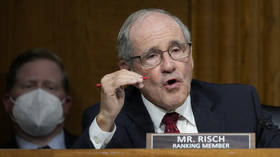US Senator pressures Hungary over NATO expansion

Top Republican Senator James Risch is blocking a US arms deal with Hungary worth hundreds of millions of dollars over its reluctance to ratify Sweden’s application to join NATO, the Washington Post reported on Wednesday.
In a statement to the paper, Risch – who serves as a ranking member in the Senate Foreign Relations Committee – said that until Hungary made progress in this regard, he would continue to stall on selling a $735-million arms package that includes 24 HIMARS batteries, as well as the ammo and hardware that comes with them.
“For some time now, I have directly expressed my concerns to the Hungarian government regarding its refusal to move forward a vote for Sweden to join NATO,” he said. “The fact that it is now June and still not done, I decided that the sale of new US military equipment to Hungary will be on hold.”
Any major US arms deal must be greenlit by top members of the Senate and House foreign affairs committees before the State Department is allowed to make a public announcement.
However, the Hungarian Defense Ministry pushed back on the senator’s comments, saying it did not plan to buy any HIMARS from the US at all. It explained that during the previous government cycle officials in Budapest requested information regarding the systems with a deadline of March 2022.
“There was no response from the American side, and the ministry considered the matter closed,” it said.
Sweden and Finland applied to join NATO last May, ditching their decades-long neutrality after the onset of the Ukraine conflict. While Finland officially became the bloc’s 31st member in April, Sweden’s application remains in limbo, waiting to be ratified by two members of the alliance – Türkiye and Hungary.
While Ankara has demanded that Sweden crack down on Kurdish groups it deems terrorist, Hungary has been holding up the accession process due to Stockholm’s criticism of Prime Minister Viktor Orban over his record on democracy and the rule of law.
Relations between the US and Hungary have also soured in recent months, with Washington sanctioning a Russian-linked investment bank and three of its executives in Budapest. The move came after Orban has repeatedly claimed that the US and its allies were pressuring its country into arming Ukraine – a policy Hungary has been reluctant to embrace.













